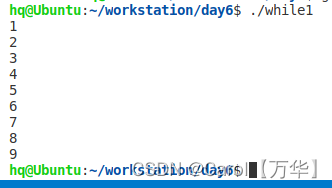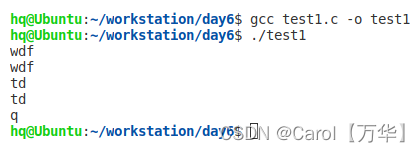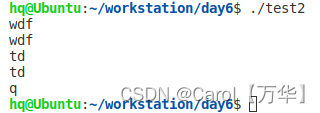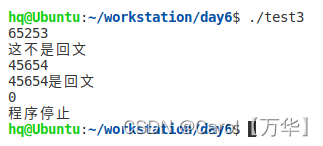while循环
格式:
先定义循环变量并赋初值
while(终止条件)
{
语句块;
增值或减值语句;
}
执行顺序:先赋初值,然后判断终止条件是否成立,如果成立就执行语句块,增值减值,然后继续判断终止条件是否成立,直到条件不成立就结束循环。
do_while
格式:
do
{
语句块;
增值减值语句;
}while(终止条件);
执行顺序:先执行后判断。
例题:打印1到9
#include<stdio.h>
int main(int argc, char const *argv[])
{
int a = 1;
while(a<10)
{
printf("%d\n",a);
a++;
}
return 0;
}

1 到10的和
#include <stdio.h>
int main()
{
int a = 1;
int sum = 0;
while (a <= 10)
{
sum = sum + a;
a++; //a自加
}
printf("%d", sum);
putchar(10);//'\n'的ASCII是10
return 0;
}

死循环:
for(;;)
{
}
while(1)
{
}
while(1);
循环控制语句
break:直接结束整个循环
continue:结束本次循环,继续下一次循环
使用场景:
在循环语句中,结束循环;使用时需要有判断语句
#include<stdio.h>
int main(int argc, char const *argv[])
{
int i;
for(i = 1;i <= 10;i++) //使用时需要有判断语句
{
printf("%d ",i); //打印从1到10
}
printf("\n");
return 0;
}

#include <stdio.h>
int main(int argc, char const *argv[])
{
int i;
for (i = 1; i <= 10; i++)
{
if (i = 4) //当i自加到4,直接结束整个循环
break;
}
printf("%d ", i); //打印输出在for循环外面
printf("\n");
return 0;
}

例题:从终端上输入一个字符并在终端上输出这个字符,当输入字符为‘q’时,程序结束。
方法一:
#include <stdio.h>
//从终端输入一个字符并在终端上输出这个字符,当输入字符'q'时,程序结束
int main(int argc, char const *argv[])
{
char i;
for (;;)
{
scanf(" %c", &i);//输入字符
if (i == 'q')
break; //输入'q'程序结束
printf("%c", i);
}
return 0;
}
输入“wdf"“td”"q"的结果

方法二:
#include <stdio.h>
int main(int argc, char const *argv[])
{
char ch;
while (1)
{
scanf("%c", &ch);
if (ch == '\n')
continue;
if (ch == 'q')
break;
printf("%c", ch);
}
return 0;
}
输入“wdf"“td”"q"的结果

垃圾字符回收
参考资料垃圾字符回收及程序的三大结构
造成垃圾字符的原因:
scanf单字符输入时规定只接收一个字符,当我们输入更多的内容时,例如我们给a赋值时键盘上输入的是 1+回车 ,则1顺利传给了a,但是多余的回车带来的换行符 \n 却被遗留在了我们的缓冲区,再继续给b赋值时,我们又进行了一次 2+回车 的操作。从而造成 “b=” 后没有值,而且进行了一次换行的情况。
————————————————
版权声明:本文为CSDN博主「cai_bi_A_LV」的原创文章,遵循CC 4.0 BY-SA版权协议,转载请附上原文出处链接及本声明。
原文链接:https://blog.csdn.net/cai_bi_A_LV/article/details/128716040
垃圾字符回收方法:
- 通过空格回收
可以回收一个或多个空格、tab、\n
scanf("%c %c",&a,&b);//只需要在使用scanf()函数时,控制格式的%c等字符前加上空格,即可实现垃圾字符的回收
- %*c
可以回收任意一个字符,不推荐使用 - getchar()
一般在循环中使用,可以回收任意一个字符
while(1)
{
scanf("%c",&a);//
printf("%c",a);//
}
练习:循环输入一个5位数,判断它是不是回文数。当输入0时循环结束。
即12321是回文数,个位与万位相同,十位与千位相同。
#include <stdio.h>
//循环一个五位数,判断是不是回文。输入0循环结束。
int main(int argc, char const *argv[])
{
while (1)
{
int a, b, c, d, e;
int finger;
scanf("%d", &finger); //以“65253”为例
//finger == a * 10000 + b * 1000 + c * 100 + d * 10 + e;
a = finger / 10000;
b = finger % 10000 / 1000;
c = finger % 10000 % 1000 / 100; //此步可省
d = finger % 10000 % 1000 % 100 / 10;
e = finger % 10;
if (finger == 0)
{
printf("程序停止\n");
break;
}
else if (a == e && b == d)
printf("%d是回文\n", finger);
else
{
printf("这不是回文\n");
}
}
return 0;
}






















 1275
1275











 被折叠的 条评论
为什么被折叠?
被折叠的 条评论
为什么被折叠?








